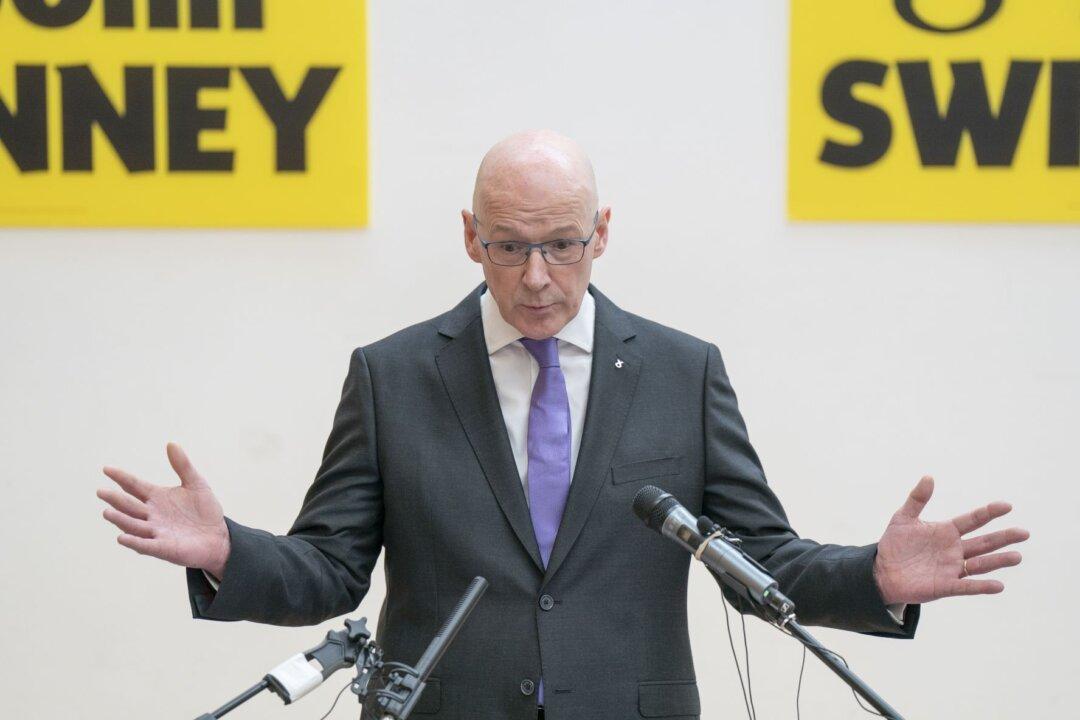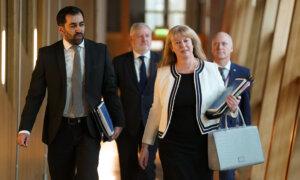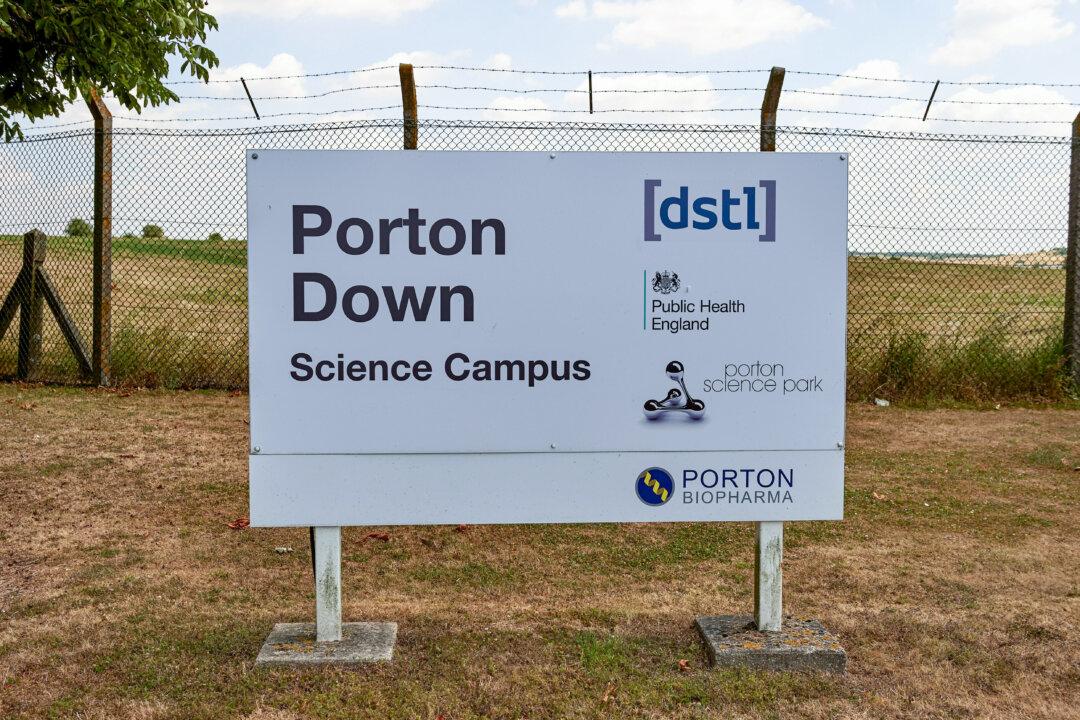Scotland’s new first minister, John Swinney, has confirmed the SNP will abandon its controversial attempt to push through the gender recognition bill, which would have allowed people to legally identify as the opposite sex from the age of just 16.
The UK government intervened to block the bill under the 2010 Equality Act because policies around discrimination are not a devolved matter, and self-ID as proposed by the SNP would have adversely impacted women and children, Westminster said.
Speaking on Sky News, Mr. Swinney confirmed that the controversial bill would be shelved when asked whether he had negotiated on the matter with his new deputy, Kate Forbes, who is vehemently opposed to the proposed reform.
He said, “No, I didn’t discuss that, but the reality of the situation that we face is that the Supreme Court has said that we can’t legislate in that area, we can’t take forward that legislation, and I accept the rule of law and that’s the position we find ourselves in, that we cannot proceed with that legislation.”
“But I think what’s the most important thing that I can say is that to LGBT people in our society, the Scottish government is on their side, we have been on their side, and we will be on their side in the years to come.”
Legal Challenge Under Yousaf
The Scottish Government, under former first minister Humza Yousaf, mounted a legal challenge after Westminster issued an unprecedented Section 35 order of the Scotland Act to prevent the bill from receiving royal assent.But last August the Court of Session in Edinburgh—the highest civil court north of the border—upheld the decision of the UK government to block the bill, with the UK’s Scottish secretary Alistair Jack urging the SNP to “stop wasting taxpayers’ money pursuing needless legal action and focus on the real issues which matter to people in Scotland.”
The proposed bill would have simplified the process of obtaining a gender recognition certificate so that those who identify as “transgender” could be legally recognised as the opposite sex after just three months and without having surgery or hormone therapy or even having a diagnosis of gender dysphoria from a doctor.
Yousaf Hinted Bill Could Be Brought Back
He became Scotland’s third first minister in just over a year following the sudden demise of Mr. Yousaf, who quit after losing a vote of no confidence after he ended the SNP’s power-sharing arrangement with the Greens.Mr. Yousaf held office for just 13 months, following the resignation of Ms. Sturgeon. The issue of self-ID and the gender recognition bill presented problems for both of Mr. Swinney’s predecessors.
Once it became clear he could not get the bill through without the support of Westminster, Mr. Yousaf hinted he would work to bring back the bill following the imminent general election and predicted change of government, suggesting that Labour would be more amenable to its proposals.

An amended version of the bill could be brought back for consideration both by Holyrood and Westminster.
The Scottish government said in an emailed statement: “The Gender Recognition Reform Bill was passed by the Scottish Parliament.
“If the UK government lifted its legal block—the section 35 order —it would become law.
“The problem is that the current UK government has said they will not.
“The Scottish government’s position is simple—UK government should lift their section 35 order.
“They have made clear however that they will not, and until they do, it is simply not legal to implement the legislation.”
Mr. Swinney’s new cabinet met for the first time at Bute House today—largely unchanged since Mr. Yousaf, apart from the new deputy leader.
Ms. Forbes served as finance secretary under Ms. Sturgeon but pulled out of the leadership contest to succeed her in March 2023 because her Christian beliefs were at odds with the SNP’s views on transgenderism.
She is now the youngest deputy first minister, taking over from Shona Robinson, who remains in the cabinet with the finance brief.
SNP stalwart Mr. Swinney led the party between 2000 and 2004 but its victories came under his successors, Alex Salmond and Ms. Sturgeon.
The Perthshire North MSP is the seventh first minister since the introduction of devolution 25 years ago.
The first minister insisted in the Sky interview that independence for Scotland is still a realistic prospect within five years, despite deep divisions within the SNP and the polls showing that it has fallen behind Labour.
For Women Scotland said in a statement to The Epoch Times: “We are quietly pleased that Swinney seems to be stepping back from pursuing GRR. It remains hugely divisive and unpopular, and we cannot see how they could bring it back without substantial amendments. Scottish Labour have also intimated that they regret supporting the law.
“Following the decision by all parties—bar the Greens—to endorse the comprehensive Cass Report, we hope that we will see a return to a grown-up, evidenced-based approach to law making in the future.”
In a separate interview given to BBC Scotland, Mr. Swinney said he was not opposed to the principle of self-ID and suggested that with a change of government in the UK, the bill could be brought back.
Alba Party General Secretary Chris McEleny said: “The Self ID obsession of the Scottish Government brought down Nicola Sturgeon and it was wise of Humza Yousaf not to appeal the decision of Scotland’s Court of Session to block the introduction of the Gender Recognition Reform Bill.
“This gender policy has completely unravelled. The overwhelming majority of the Scottish public were opposed to it and would be bewildered to learn that John Swinney still supports it in principle and would introduce it tomorrow if he could.
“The first minister surely is wise enough to know that it was the Highest Court in Scotland that deemed the policy unlawful—not the UK Supreme Court as he claimed on several occasions. His poor attempt to deflect the question though has exposed that the Greens have been kicked out of Government but John Swinney’s new SNP are still desperate to appease them.”







